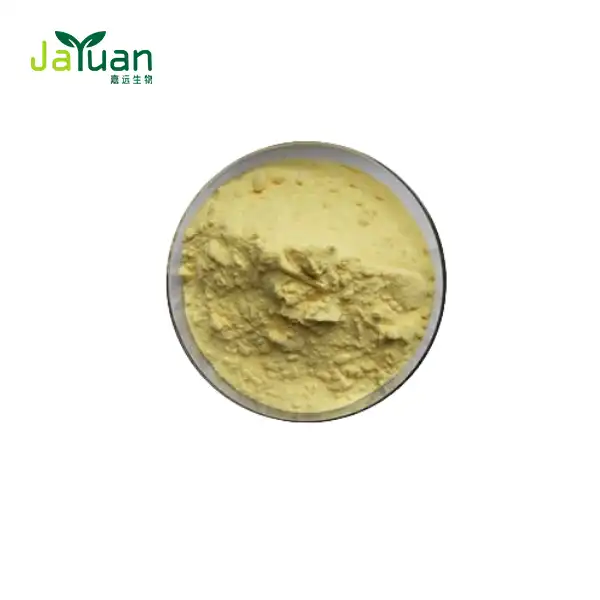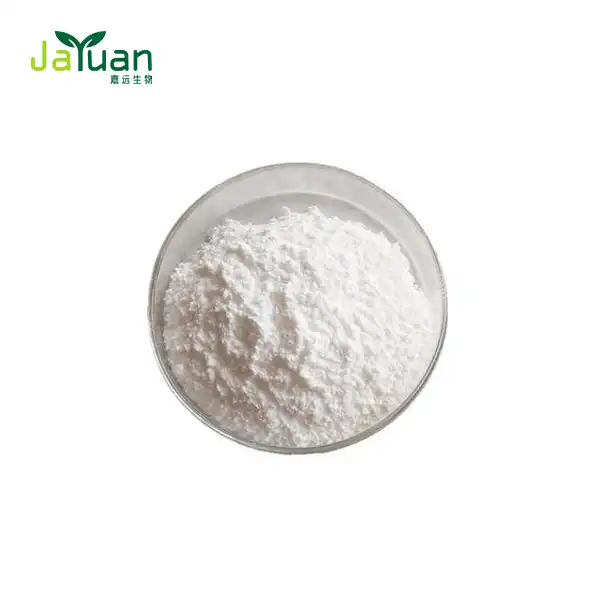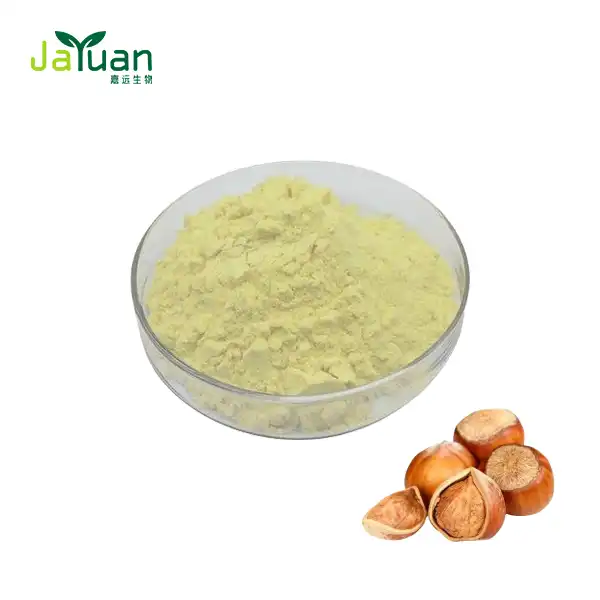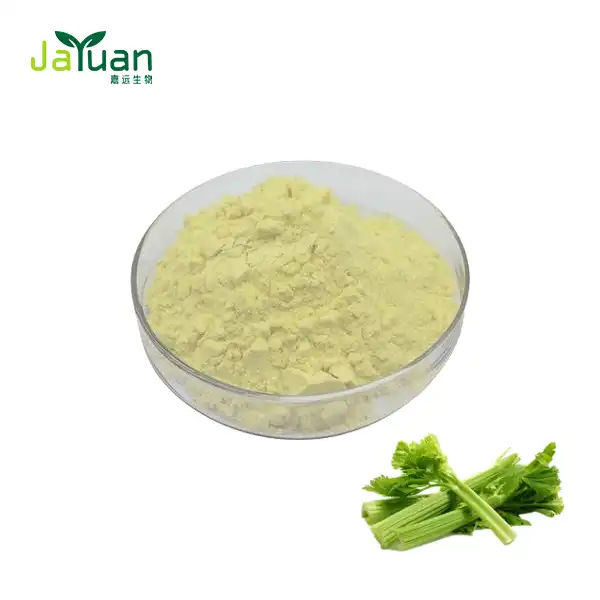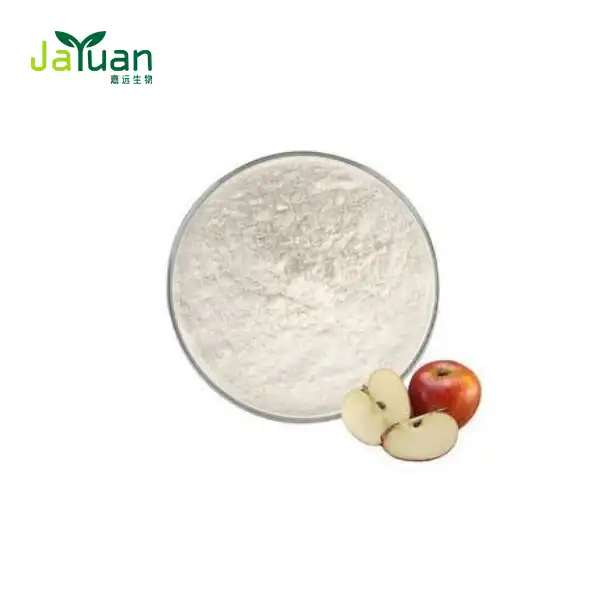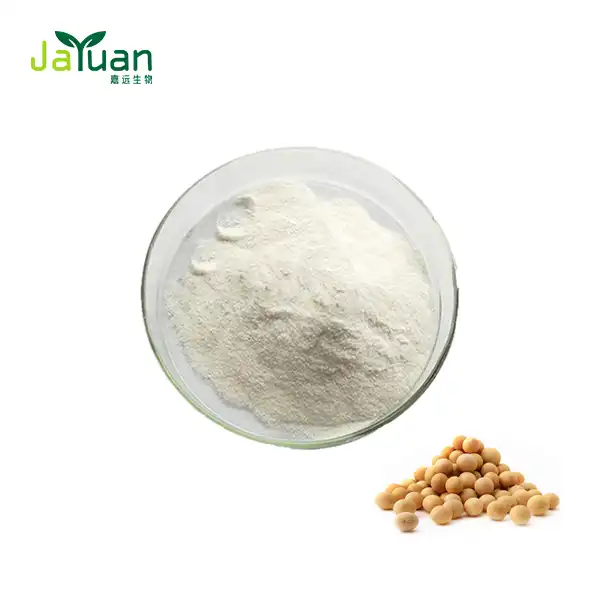From Red Wine to Supplements: The Science of Resveratrol
Have you ever wondered about the secret behind the purported health benefits of red wine? The answer lies in a fascinating compound called resveratrol. This powerful antioxidant has captured the attention of scientists and health enthusiasts alike, prompting a surge in research and the development of dietary supplements. In this comprehensive guide, we'll explore the journey of the product from its origins in red wine to its emergence as a popular health supplement.
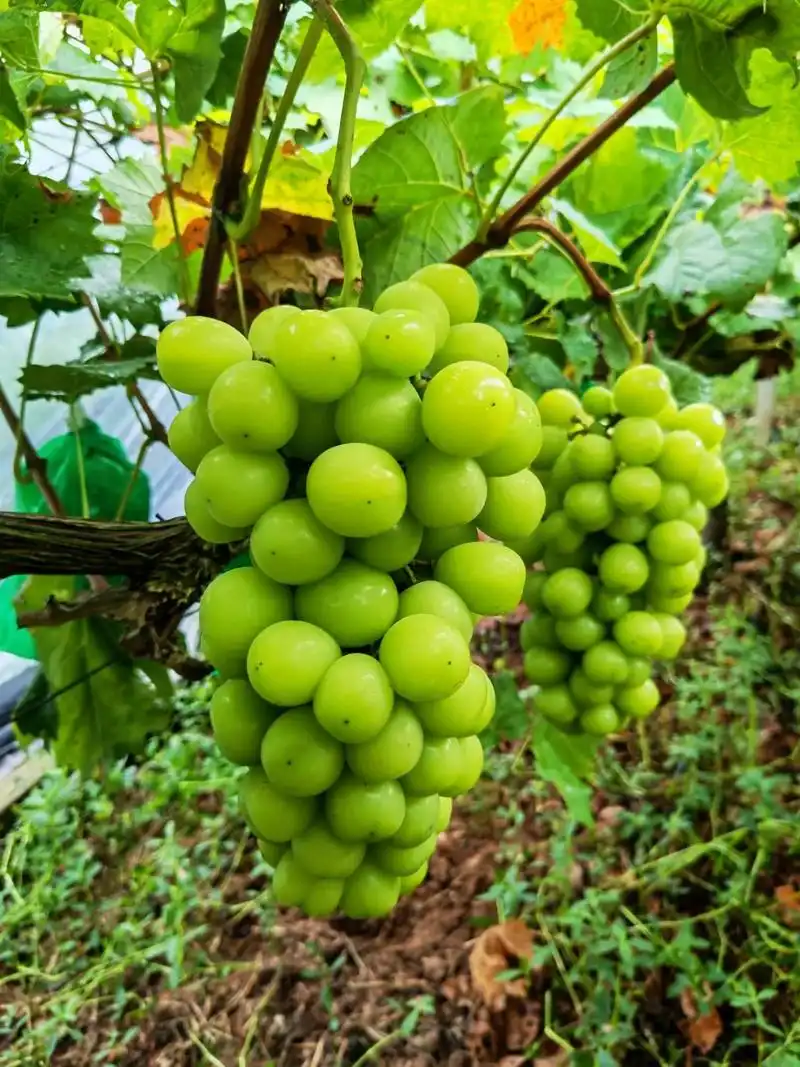
Botanical source: Polygonum cuspidatum Sieb, Grape
CAS NO.: 501-36-0
Specs Available: 50%;98%;99%(HPLC)
Part of used: Root
Appearance: White to off-white fine powder
Other Names: trans-3,4,5-trihydroxystilbene
Molecular Weight: 228.24
Molecular Formula: C14H12O3
MOQ: 500gG-1KG
Customized service: Support adjusting purity (50%-99%) according to customer needs.
Payment: 100% TT in advance
Certificaions: FSSC2000/ISO2000/HALAL/KOSHER/HACCP
Delivery terms: FedEx, DHL, EMS, UPS, TNT, all kinds of the airline, international shipping companies.
Free sample is available.
We do not sell retail quantities to individuals.
Our Key Advantages:
Factory Direct Price: Competitive pricing from the manufacturer.
Stable Supply: Reliable and consistent product availability.
Guaranteed Quality: High-quality assurance with each shipment.
After-Sales Support: Full refund guarantee in case of any issues.
Customization Options: We offer tailored production, including OEM and ODM services.
Should you have any questions or require further details, feel free to contact me via sales@jayuanbio.com and sales1@jayuanbio.com at any time.
We look forward to the possibility of working together.
Red Wine's Secret: Uncorking Benefits
It's a naturally occurring polyphenol, has been the subject of numerous studies due to its potential health-promoting properties. While it's found in various plants, including peanuts, blueberries, and cranberries, its most notable source is the skin of red grapes – and by extension, red wine.
The Revolution: From Grapes to Glass
The process of making red wine involves fermenting grape juice with the skins and seeds, which allows for a higher concentration of the product in the final product. This is why red wine contains significantly more of it than white wine, which is fermented without the grape skins.
Interestingly, the product content in wine can vary depending on factors such as grape variety, growing conditions, and winemaking techniques. You should evaluate the product's purity and source while thinking about purchasing it. According to certain research, wines produced from Pinot Noir grapes typically contain larger concentrations of the product than those created from other kinds.
Beyond the Bottle: Potential Health Benefits
The fascination with its stems from its potential to promote various aspects of health. Research has suggested that the product may:
- Support heart health by promoting healthy blood pressure levels and cholesterol balance
- Contribute to cognitive function and brain health
- Aid in maintaining healthy blood sugar levels
- Support cellular health and longevity
- Promote a healthy inflammatory response
While these potential benefits are exciting, it's important to note that many studies have been conducted in laboratory settings or on animals. More research is needed to fully understand how the product affects human health in real-world conditions.
Pros and cons of supplements and natural sources
As interest in it has grown, so has the market for the productl supplements. However, the question remains: is it better to get your product from natural sources like red wine and grapes, or should you opt for a concentrated supplement?
The Natural Approach: from Food Sources
Obtaining it from natural sources like red wine, grapes, and berries has several advantages:
- Whole food synergy: Natural sources provide the product alongside other beneficial compounds that may work together synergistically
- Balanced intake: It's difficult to overconsume it from food sources
- Additional nutrients: Foods containing it often provide other essential vitamins and minerals
However, there are also some drawbacks to relying solely on natural sources:
- Variable content: The amount of the product can vary greatly depending on factors like growing conditions and processing methods
- Lower concentration: It can be challenging to consume enough of it from food sources alone to match the levels used in some studies
- Alcohol consumption: Relying on red wine as a primary source of the product may lead to excessive alcohol intake
The Supplement Solution: Concentrated Resveratrol
The product supplements offer a more concentrated and standardized dose of the compound. Some advantages of supplements include:
- Precise dosing: Supplements allow for a controlled and consistent intake of the product
- Higher concentrations: Supplements can provide doses that would be difficult to achieve through diet alone
- Convenience: It's easier to incorporate a supplement into your daily routine than to consume large quantities of resveratrol-rich foods
However, supplements also have potential drawbacks:
- Lack of regulation: The supplement industry is not as tightly regulated as pharmaceuticals, which can lead to quality concerns
- Potential interactions: High doses of the product may interact with certain medications or affect blood clotting
- Isolated compound: Supplements typically provide it in isolation, potentially missing out on the synergistic effects of whole foods
Dosage Dilemma: How Much Is Enough?
One of the most challenging aspects of incorporating it into your health regimen is determining the appropriate dosage. This is complicated by the fact that research on optimal dosing is still ongoing, and different studies have used varying amounts.
Navigating the Numbers: Dosage Considerations
When it comes to resveratrol dosage, there's no one-size-fits-all approach. Here are some factors to consider:
- Research dosages: Many studies have used doses ranging from 100 mg to 2000 mg per day
- Body weight: Some researchers suggest that dosage may need to be adjusted based on an individual's weight
- Bioavailability: The body's ability to absorb and utilize the product can vary, which may affect optimal dosing
- Form of the product: Some forms, such as trans-resveratrol, are considered more bioavailable than others
It's important to note that while higher doses have been used in some studies, they may also increase the risk of side effects. Always consult with a healthcare professional before starting any new supplement regimen.
From Grape to Capsule: Understanding its Supplements
If you're considering the supplement of it, it's crucial to understand what you're getting. Here are some key points to keep in mind:
- Source matters: Its supplements can be derived from various sources, including Japanese knotweed, red wine extract, or grape skin extract
- Purity and standardization: Look for supplements that clearly state the amount of the product per serving and have been third-party tested for purity
- Additional ingredients: Some supplements combine it with other compounds like quercetin or grape seed extract, which may offer complementary benefits
- Form of supplement: The product is available in various forms, including capsules, powders, and liquids. Choose the form that best fits your lifestyle and preferences
When selecting a supplier, it's essential to choose a reputable company that prioritizes quality and transparency. Look for manufacturers that follow Good Manufacturing Practices (GMP) and provide detailed information about their sourcing and production methods.
Balancing Act: Combining Natural Sources and Supplements
For many people, the ideal approach to incorporating it into their health routine may involve a combination of natural sources and supplements. When considering resveratrol manufacture, you need to pay attention to the quality control and sourcing of the ingredients. This balanced approach allows you to enjoy the benefits of whole foods while potentially boosting your intake with a high-quality supplement.
Here are some tips for creating a balanced regimen:
- Incorporate resveratrol-rich foods into your diet, such as red grapes, berries, and peanuts
- Enjoy moderate amounts of red wine, if appropriate for your health status and lifestyle
- Consider its supplement to boost your intake, especially if you're targeting specific health goals
- Monitor your overall antioxidant intake, as the product is just one of many beneficial compounds found in a healthy diet
Remember, while the product shows promise in supporting various aspects of health, it's not a magic bullet. A balanced approach that includes a healthy diet, regular exercise, and other lifestyle factors is key to optimal well-being.
The Future Research
As interest in it continues to grow, researchers are exploring new avenues for its potential applications. Some areas of ongoing research include:
- Improved delivery methods to enhance bioavailability
- Combination therapies that pair it with other beneficial compounds
- Long-term studies to better understand the effects of the product supplementation over time
- Personalized approaches to its supplementation based on individual genetic profiles
As we learn more about this fascinating compound, it's likely that our understanding of its benefits and optimal use will continue to evolve.
Conclusion
In conclusion, the journey of resveratrol from red wine to supplements represents an exciting area of nutritional science. Whether you choose to enjoy product through natural sources, supplements, or a combination of both, it's clear that this powerful antioxidant has captured the attention of health-conscious individuals worldwide. As research progresses, we may uncover even more potential benefits of this intriguing compound.
If you're interested in exploring high-quality products for your health regimen or business needs, we invite you to reach out to our team at Jayuan Bio. Our experts are ready to discuss your requirements and help you find the perfect product solution. Contact us at sales@jayuanbio.com or sales1@jayuanbio.com to learn more about our premium products offerings and how we can support your health and wellness goals.
At Jayuan Bio, we pride ourselves on our commitment to quality, innovation, and customer satisfaction. Our state-of-the-art facilities and rigorous quality control processes ensure that you receive only the finest products. From our carefully selected raw materials to our advanced extraction techniques, every step of our production process is designed to deliver superior results. Experience the Jayuan Bio difference and unlock the potential of the product for your health or business today!
References
1. Smoliga, J. M., Baur, J. A., & Hausenblas, H. A. (2011). Resveratrol and health – A comprehensive review of human clinical trials. Molecular Nutrition & Food Research, 55(8), 1129-1141.
2. Weiskirchen, S., & Weiskirchen, R. (2016). Resveratrol: How Much Wine Do You Have to Drink to Stay Healthy? Advances in Nutrition, 7(4), 706-718.
3. Gambini, J., Inglés, M., Olaso, G., Lopez-Grueso, R., Bonet-Costa, V., Gimeno-Mallench, L., ... & Borras, C. (2015). Properties of resveratrol: in vitro and in vivo studies about metabolism, bioavailability, and biological effects in animal models and humans. Oxidative Medicine and Cellular Longevity, 2015.
4. Riche, D. M., McEwen, C. L., Riche, K. D., Sherman, J. J., Wofford, M. R., Deschamp, D., & Griswold, M. (2013). Analysis of safety from a human clinical trial with pterostilbene. Journal of Toxicology, 2013.
5. Berman, A. Y., Motechin, R. A., Wiesenfeld, M. Y., & Holz, M. K. (2017). The therapeutic potential of resveratrol: a review of clinical trials. NPJ Precision Oncology, 1(1), 1-9.
6. Tomé-Carneiro, J., Larrosa, M., González-Sarrías, A., Tomás-Barberán, F. A., García-Conesa, M. T., & Espín, J. C. (2013). Resveratrol and clinical trials: the crossroad from in vitro studies to human evidence. Current Pharmaceutical Design, 19(34), 6064-6093.

